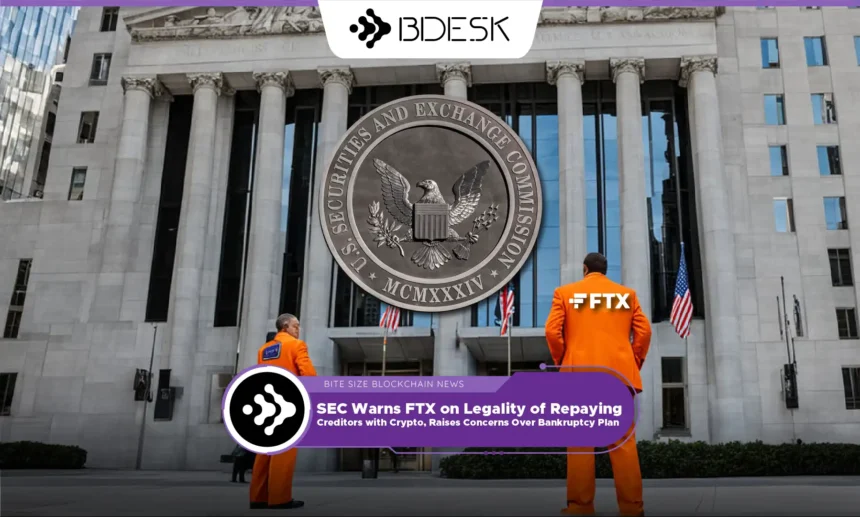Summary:
- SEC’s Warning: The Securities and Exchange Commission (SEC) cautions FTX about potential legal challenges regarding its plan to repay creditors using crypto asset securities.
- Stablecoin Distribution Concerns: The SEC highlights the lack of clarity on who would distribute stablecoins if the plan is approved.
- Legal Objections: The SEC and U.S. Trustee oppose a discharge provision in FTX’s bankruptcy plan that would shield debtors from future legal actions.
- Bankruptcy Costs: Administrative costs for FTX’s bankruptcy have soared, with fees exceeding $800 million.
- Payout Plan: FTX’s liquidation plan proposes creditor payments based on the US dollar value at the time of bankruptcy, either in cash or stablecoins.
- Crypto Community’s Reaction: The SEC’s stance has drawn criticism from industry figures, including Galaxy Digital’s Alex Thorn and Coinbase’s Paul Grewal, accusing the regulator of overreach.
The Securities and Exchange Commission (SEC) has issued a stern warning to FTX, signaling that it may challenge the legality of the exchange’s plan to repay creditors using its stash of “crypto asset securities.” This development comes as part of the ongoing bankruptcy proceedings following FTX’s dramatic collapse last year.
In a recent filing, the SEC expressed concerns that the proposed plan lacks specifics, particularly regarding who would be responsible for distributing stablecoins if that provision is approved. While the SEC did not explicitly declare the plan illegal, it emphasized that it reserves the right to contest any transactions involving crypto assets. “The SEC is not opining as to the legality, under the federal securities laws, of the transactions outlined in the Plan,” the filing states, but the agency made it clear that it could take action if necessary.
The SEC’s filing coincides with objections from the U.S. Trustee overseeing the bankruptcy. Both the SEC and the Trustee have raised issues with a discharge provision in FTX’s plan that would effectively protect the exchange’s debtors from future legal actions by creditors. The U.S. Trustee argued that the court should deny the plan’s confirmation unless this provision is removed, citing relevant legal statutes.
The administrative costs of FTX’s bankruptcy have ballooned in the months since the exchange’s downfall, with fees requested by its staff recently surpassing $800 million, as noted by X user Mr. Purple.
Amid these challenges, FTX’s most recent liquidation plan proposes that creditor claims be paid out based on the US dollar value of asset prices at the time of bankruptcy. These payments would be made either in cash or with stablecoins, addressing the calls from many creditors for in-kind payments.
The SEC’s stance has sparked a backlash within the crypto community. Notable figures like Alex Thorn, head of research at Galaxy Digital, and Paul Grewal, chief legal officer at Coinbase, have criticized the regulator for what they see as “overreaching” and making unreasonable threats against FTX creditors. Thorn, in a Sept. 1 post on X, highlighted the SEC’s ongoing reservations about categorizing dollar-backed stablecoins as “crypto asset securities,” despite the regulator previously dropping its case against Paxos, the issuer of Binance USD (BUSD), in July.
As the bankruptcy proceedings continue, FTX and its creditors face uncertainty, with the SEC’s warning adding another layer of complexity to an already fraught situation.
Disclaimer:
The information provided on 13Desk is for informational purposes only and should not be considered financial advice. We strongly recommend conducting your own research and consulting with a qualified financial advisor before making any investment decisions. Investing in cryptocurrencies carries risks, and you should only invest what you can afford to lose. 13Desk is not responsible for any financial losses incurred from your investment activities.











